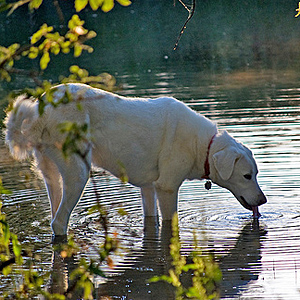 As many of you know by now, we changed our canine vaccine protocol about two years ago. Instead of giving our standard Distemper/Parvo vaccine (which covers 6 different diseases: K9 Distemper, Hepatitis, Leptospirosis, Para-Influenza, Parvo Virus and Corona Virus) every year, we are now only vaccinating for the Leptospirosis portion of that combination each year and vaccinating for the rest of the combination every three years. Many of you have been asking what Leptospirosis is so we have composed a FAQ sheet for you.
As many of you know by now, we changed our canine vaccine protocol about two years ago. Instead of giving our standard Distemper/Parvo vaccine (which covers 6 different diseases: K9 Distemper, Hepatitis, Leptospirosis, Para-Influenza, Parvo Virus and Corona Virus) every year, we are now only vaccinating for the Leptospirosis portion of that combination each year and vaccinating for the rest of the combination every three years. Many of you have been asking what Leptospirosis is so we have composed a FAQ sheet for you.
Leptospirosis FAQ sheet
What is Leptospirosis?
Leptospirosis is a disease caused by the spirochete bacteria Leptospira. It can cause infections in most wild and domestic animals including dogs and it is considered a zoonotic disease meaning humans can be infected with it from animals.
How are infections spread?
Animals that have recovered from a Leptospirosis infection shed the organisms in their urine for months to years following infection. Exposure usually occurs by contact with Leptospires in the environment (contaminated water, food, bedding, soil, vegetation or other objects) or direct contact with urine from an infected animal. The organism penetrates mucosa (i.e. tissues within the mouth) or abraded skin and open wounds. Wild animals and rodent populations are considered reservoirs for Leptospirosis.
What happens after contracting an infection?
Leptospiremia (Leptospire infection within the bloodstream) occurs 4-12 days post-infection. The organism multiplies in the bloodstream then invades internal organs primarily targeting the kidneys and liver. It can replicate in the kidneys causing acute injury and renal failure. In the liver, it can damage liver cells resulting in liver failure.
How is it treated?
Treatment revolves around addressing dehydration with fluid therapy as well as appropriate antibiotics.
How can infection be prevented?
In dogs, prevention of exposure is not a realistic expectation so vaccination is recommended.
People can minimize their risk with proper hygiene especially regarding exposure to urine. Avoid stagnant pools of water especially if you have open wounds.
What isn’t my cat vaccinated for Leptospirosis?
Although cats can be infected, they do not develop clinical disease from it.




